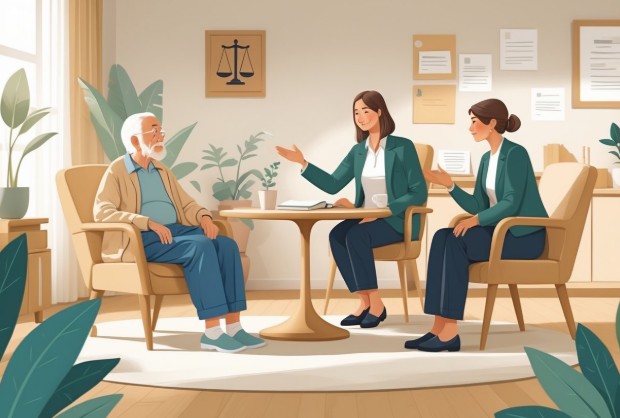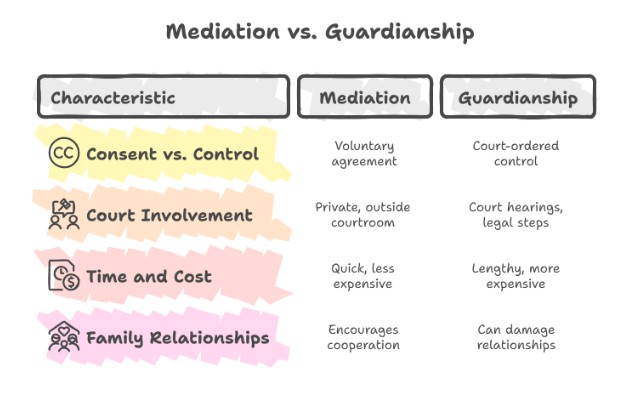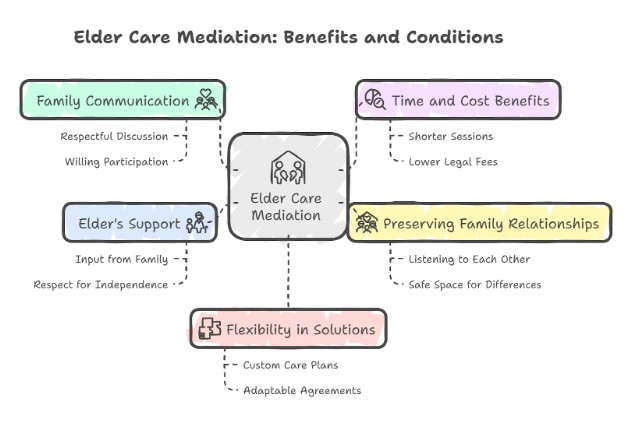Call Now For Service!
Originally published: August 2025 | Updated: September 2025 | Reviewed by Kim Torres

When families in Austin have to make tough calls about caring for aging parents, two legal routes usually come up: elder care mediation and guardianship.
Both help families deal with complicated situations involving an elderly loved one’s health, finances, and daily care.
Elder care mediation helps maintain family relationships and allows the elderly person to remain in control of their own life. Guardianship, on the other hand, takes away legal rights and really should be a last resort.
Elder mediation helps families avoid the court system, which can be expensive and time-consuming, often lasting for months.
Clarifying the differences between these two options enables families to make informed choices for their loved ones.
The decision ultimately depends on the older adult’s mental capacity, the family’s dynamics, and the specific details of their situation.
Each option has its own process, price tag, and impact on both the family and the aging adult. It’s not always obvious which is best, and sometimes you just have to weigh the pros and cons.
Struggling to support an aging parent without conflict? Torres Mediation assists Austin families in resolving elder care issues in a private and respectful manner. Contact us today to explore your best next step.
If you’re ready to get started, call us now!

Elder care mediation is a collaborative problem-solving process that guides families through the challenges of aging. A neutral mediator steps in to help the family and the older adult talk things through.
The mediator doesn’t make decisions for anyone. Instead, they steer the conversation so everyone gets heard and can (hopefully) reach an agreement together.
Common Issues Addressed:
Elder mediation can help families navigate challenging issues, such as caregiving and determining the best course of action for the family home. It provides a space for everyone to discuss these matters openly, without things getting heated (usually).
People often discuss the power of attorney or who should make medical or financial decisions. These are significant decisions, and it’s easy for things to become emotional quickly.
The mediation process ensures that the senior’s rights and dignity are upheld throughout. The older adult stays involved in decisions about their life, which feels fairer to most people.
Key Benefits:
Elder mediation also helps when disagreements crop up between caregivers, nursing homes, and families. Mediators trained in elder issues understand how complex and intense these emotions can be.
The primary goal is to find solutions that everyone can live with, while still respecting the older adult’s wants and needs. It’s not always easy, but it’s usually less painful than court.
Guardianship is a legal relationship in which a court appoints someone to make decisions on behalf of a person who is unable to manage their own affairs.
The court actually takes away certain rights from the person and hands them to the guardian.
The person getting help is called the ward. The helper is the guardian.
Texas guardianship is almost always about adults who can’t make decisions because of physical or mental conditions. So, it’s not really something for kids.
Key aspects of Texas guardianship:
Guardianship removes civil rights and privileges by giving control to someone else. It’s a big deal, and courts don’t take it lightly.
The need for guardianship typically arises due to age, disability, or injury. Texas says someone is legally incapacitated if they can’t handle their own affairs because of their condition.
Note: Some states refer to this as conservatorship, but in Texas, it is known as guardianship—even for financial matters.

Mediation is a voluntary process that relies on mutual agreement within the family. Guardianship, though, means a court takes control over an adult’s decisions.
These two options are worlds apart in terms of cost, time, and their impact on family relationships.
Mediation only works if everyone agrees to show up and participate. The aging adult keeps all their legal rights during the process.
No one loses the ability to make decisions through mediation. Family members hash things out and, if possible, agree on a plan. Anyone can walk away at any time.
Guardianship, on the other hand, is all about court intervention. A judge determines whether a person is unable to make their own decisions regarding money, healthcare, or where to live.
The guardian gains legal control over the major decisions. The aging adult loses the right to sign contracts, manage money, or choose where they live. That legal status remains unchanged unless a court later alters it.
Mediation happens in private, outside the courtroom. Families meet with a mediator who guides the discussion, but nobody has to answer to a judge.
The mediator can’t force anyone to do anything. They just help people talk things out and (hopefully) reach a solution. Everything stays confidential and low-key.
Guardianship, however, entails court hearings and numerous legal steps. A formal guardianship proceeding is a judicial process in which lawyers present their case to a judge.
The court appoints attorneys, reviews evaluations, and looks at medical records. All of it goes on the public record. The judge makes the final call about the aging adult’s capacity and care.
Mediation typically concludes within a few weeks or months. It’s much cheaper than court because you skip attorney fees and court costs. Families also avoid paying for expert witnesses and evaluations.
Most mediation cases finish in three to six sessions. The total cost can be about the same as one court hearing for guardianship.
Guardianship can drag on for months or even years. Legal fees pile up: you have to pay for your lawyer, the aging adult’s lawyer, and sometimes court-appointed evaluators. Elder mediation can help families avoid these pricey court battles.
Typical Guardianship Costs:
Mediation encourages cooperation and helps keep family ties from fraying. People work together to solve problems, not fight it out in court.
Conversations remain private and, ideally, respectful. The mediator helps everyone understand where others are coming from. Sometimes, this actually brings families closer, although not always; let’s be honest.
Guardianship can turn family members against each other. Court fights get ugly, and relationships may never recover. One person wins legal control; others get sidelined.
The aging adult might feel betrayed or angry about losing independence. Family members who pushed for guardianship sometimes face resentment that lingers. These wounds can last long after the legal case ends.
Once a court orders guardianship, earlier estate planning documents (like wills or powers of attorney) take a back seat. The guardian’s authority overrides arrangements the aging adult made when they were still capable.
Travis County handles all guardianships through the Probate Court. You must use an approved guardianship attorney to initiate the process.
The attorney files a guardianship application with the county court. The family needs to obtain a doctor’s certificate stating that the proposed ward is unable to make decisions.
This is referred to as a Health Care Provider’s Certificate of Medical Examination.
The court schedules a hearing after getting the application. A judge reviews all the paperwork and might interview the proposed ward. The judge decides if guardianship is necessary.
Cost Breakdown:
| Expense Type | Description |
| Legal fees | Attorney costs for filing and representation |
| Court expenses | Filing fees and court costs |
| Medical evaluation | Doctor’s examination and certificate |
| Ongoing reporting | Annual reports and documentation |
Setting up and maintaining guardianship comes with a lot of expenses. Legal fees usually take the biggest bite.
Guardians are required to file annual reports with the court. These reports track the ward’s progress and document how the guardian has spent the allocated funds. The court reviews these documents annually.
The entire process can span several months. The time it takes depends on the judge’s calendar and the complexity of the case.
Before pursuing guardianship, explore more compassionate options. Torres Mediation offers elder care mediation in Austin, helping families reach an agreement without the need for court involvement. Schedule a session today.
If you’re ready to get started, call us now!
Elder mediation keeps seniors at the center of decisions about their own lives. Unlike guardianship, which can strip away decision-making power, mediation gives seniors a real voice in choices that affect them, supporting their autonomy and dignity.
Key ways mediation preserves autonomy:
The process respects the wishes of older adults regarding their care and living situations. They can speak up about medical choices or daily care needs.
Mediation protects dignity by treating seniors as capable adults. The mediator makes sure everyone listens to the older person’s viewpoint.
This approach recognizes that aging doesn’t mean losing the right to make choices. Families sometimes realize their loved one has strong preferences about their care.
The senior might want to stay home longer or pick certain family members as caregivers.
Elder mediation helps families resolve issues such as caregiving, estate disputes, and decisions regarding the family home.

Elder care mediation is most effective when families can discuss care decisions respectfully, even if they disagree. Everyone needs to participate willingly for it to work.
Mediation succeeds when family members can sit together and talk. The elderly person should be able to express their wishes.
Basic respect between family members is essential. Without it, things can get messy fast.
Common Situations for Mediation:
Mediation typically concludes in just a few sessions. This saves families months or even years of court time.
Legal fees are significantly lower than those for guardianship proceedings. That’s a relief for everyone involved.
The process helps siblings actually listen to each other. Mediation provides a safe space to work through differences.
Families often keep better relationships afterward. It’s not a guarantee, but it’s possible.
Mediation works well when the elderly person wants input from their family. They can join discussions about their future.
This approach respects their independence while still addressing family concerns. It’s a delicate balancing act, but it can be effective.
Mediators help families create custom care plans. These agreements can change as needs change.
Court orders from guardianship cases just can’t offer that kind of flexibility. Mediation feels more personal.
Guardianship becomes necessary when individuals are unable to manage their financial and healthcare matters, and no less restrictive options are available. This legal process protects elderly individuals who have become incapacitated, ensuring their well-being and financial stability.
Key situations that require guardianship include:
Someone must petition the court and show evidence that the individual is incapacitated. The court then determines whether a guardian is truly necessary.
Safety concerns often prompt families to consider guardianship. If an elderly person can’t recognize dangers or make safe choices, family members may need court intervention.
Financial exploitation is another urgent reason for guardianship. Vulnerable adults may give away money or fall victim to scams without protection.
Guardianship is necessary when a loved one becomes incapacitated and hasn’t already chosen someone through a power of attorney. The process needs court approval and ongoing supervision.
Unlike voluntary arrangements, guardianship involves court oversight. The appointed guardian reports regularly to make sure they act in the ward’s best interests.
Elder care mediation and guardianship play different roles for Austin families. Each one fits specific needs and situations.
Mediation is effective when family members are willing to communicate and genuinely want to participate. It helps keep relationships intact and allows seniors to maintain their independence.
However, sometimes guardianship is the only viable option. If someone can’t make safe decisions, families may have to step in. Guardianship disputes arise when loved ones can’t agree on care or financial matters.
Key factors to think about:
Elder mediation provides families with an opportunity to avoid court, which can be a time-consuming and costly process. Many people find it worthwhile to try mediation as a first option.
Still, sometimes the court must intervene. When that happens, judges focus on the ward’s well-being above all else.
Guardianship isn’t always the only path. Torres Mediation helps Austin families protect their loved ones while preserving their voice. Contact us now to resolve conflicts with care and clarity.
What’s the main difference between elder mediation and guardianship?
Mediation is a private, voluntary process that enables families to agree on care decisions collaboratively. Guardianship is a legal proceeding that gives someone court-ordered authority over another person’s health or finances.
Can mediation help families avoid guardianship?
Yes. Mediation can resolve many elder care conflicts early—especially when the elder still has capacity—reducing the need for court-imposed guardianship.
How much does guardianship cost in Austin?
Guardianship costs in Travis County can range from $2,500 to $10,000 or more, depending on attorney fees, medical evaluations, court costs, and annual compliance requirements.
Who can serve as a legal guardian under Texas law?
A guardian can be a family member, friend, or court-appointed professional. The court prioritizes individuals who are responsible, willing, and in the elder’s best interest.
Is a mediation agreement legally binding?
Yes. If all parties agree, a mediation agreement can be put in writing and signed. It may be enforceable like any legal contract, especially if reviewed by an attorney.